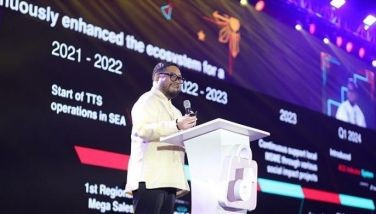Flowers of spring

WASHINGTON – “If you knew my story, you would care.”
A woman in the “City of Joy,” a center opened last month to assist victims of sexual violence in the Democratic Republic of the Congo, said this to Pat Mitchell, former news anchor and now president and CEO of the Paley Center for Media.
The horrific stories of the women in the City of Joy have since been reported. But Mitchell, addressing top women media executives from around the world at George Washington University here, pointed out that on average, only 17 percent of news stories in most countries are about women.
This was reported in the latest edition of a global study called “Who Makes the News?”
Mitchell was the speaker at the closing session of the first International Conference of Women Media Leaders, held here from March 22 to 25 and organized by the International Women’s Media Foundation (IWMF).
The Yemen Times’ editor-in-chief Nadia al-Sakkaf, in a veil and her country’s traditional clothing, pounded away at her laptop as Mitchell recounted her early days in a male-dominated US media, when she had to leave her high-heeled shoes outside the toilet entrance because NBC didn’t have a separate lavatory for women.
While top female American media personalities from organizations including the Washington Post, CNN, the Associated Press, Yahoo! News and Glamour were among the participants at the conference, Mitchell echoed her colleagues’ complaints about a glass ceiling in US media.
We were told that this is also a problem in Western Europe, although almost all of the participants from the region are editors-in-chief. I found this glass ceiling as surprising as the fact that women in media in Eastern Europe and China did not suffer from gender discrimination in the workplace. That is probably one positive outcome of the communist egalitarian ideal: in these societies, women truly hold up half the sky.
I was also pleasantly surprised to meet top women editors and media managers from places such as Afghanistan, Lebanon, the Palestinian territories (she and an Israeli delegate hugged at the end of our conference) and sub-Saharan Africa.
Throughout the conference, speakers exhorted us to get the women’s stories out. As Mitchell put it, the Congolese woman was “turning her pain to power” by telling her story of sexual violence, and women in media have “the power to change that story.”
* * *
In other countries, the problem is not just a glass ceiling but an acute lack of women in media. This is the case in Liberia, where there are only seven trained women journalists.
Where women’s stories are untold, gender gaps tend to be widest. And where women are most marginalized, there is often conflict, instability and abject poverty.
“Humanity has no greater underutilized resource than women,” Melanne Verveer told us at a luncheon speech here.
Verveer’s appointment as the first-ever US ambassador-at-large for global women’s issues, under the office of the secretary of state, indicates that the Obama administration is giving priority to women empowerment worldwide.
Verveer cited a study many years ago showing that educating a girl is “the single most important investment that can be made” in development. Women empowerment is “good economics,” according to World Bank President Robert Zoellick. It is the secret of economic growth, according to Verveer’s immediate boss Hillary Clinton, who believes that societies are more dangerous and extremism more likely to take hold where women are oppressed.
It is “a simple fact,” Verveer told us, that no country can get ahead if half of its population is left behind. The US is pushing for women empowerment particularly in the Arab world, now rocked by freedom movements. An “Arab renaissance” is not possible without the educational, economic and political participation of women, Verveer emphasized.
Ten years ago, the United Nations Security Council passed Resolution 1325, calling for an end to impunity in sexual violence. While some progress has been made, Verveer noted, it has not been fast enough.
But she expressed the belief that “we are rather at a tipping point.” Women are at the forefront in mass protests in the Arab world and are courageously fighting for their rights.
Verveer recalled a meeting with Afghan women who told her, “Please do not look at us as victims. Look at us as the leaders that we are.”
* * *
On the last day of our conference here, we adopted a plan of action to remove gender barriers in media in our respective regions.
It must be noted that men apart from US President Barack Obama are supportive of these efforts. During our session on social media at the Newseum, Judy Woodruff of PBS Newshour moderated a forum featuring an all-male panel representing the sponsors of our conference: Bloomberg News editor-in-chief and co-founder Matt Winkler, philanthropist Howard Buffett and Knight Foundation president and CEO Alberto Ibarguen. As Woodruff emphasized, achieving gender equality requires the cooperation of men.
Progress has been made, but women have a long way to go. BBC’s Washington-based political reporter Katty Kay recalled that a generation ago when she lived with her family in Saudi Arabia, her mother, also a journalist, interviewed government ministers, all of them men. The mother was told that she was the first woman to ever enter those Saudi offices; even the cleaners were men.
Kay said she would send her mom a copy of the first Global Report on Women in the News Media, which was released during our conference.
Verveer observed that women who get media training in societies where the gender gap is wide develop better self-esteem and confidence to confront day-to-day challenges.
She recounted a meeting with women journalists in Afghanistan who gave her a corsage.
“One flower does not make spring. But many flowers coming together do make spring,” they told her. “We hope that we will be the spring that will come to our country.”
- Latest
- Trending





















